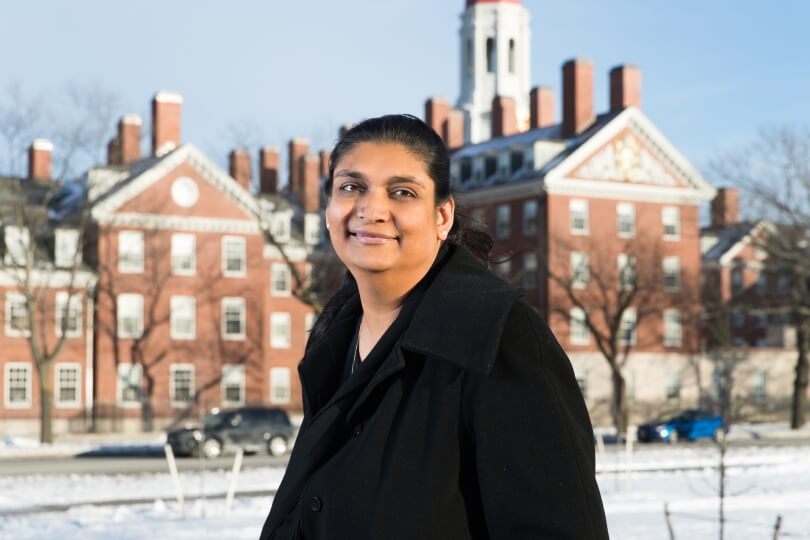Having a sufficient oxygen supply is essential for hospitals treating patients with COVID-19. The disease impacts patients’ breathing and lung function, and supplemental or concentrated oxygen can be critical to keeping patients alive.
Gitika Srivastava (A.B. '01) spent much of 2021 fundraising and arranging shipping for equipment for a large-scale COVID-19 relief effort in India. (Credit: Gitika Srivastava)
Gitika Srivastava (A.B. ‘01) saw the dangers of insufficient oxygen supply in her home country of India, especially in hospitals in smaller towns or rural communities.
“The way COVID-19 was spreading in India, there was not enough of a supply of oxygen plants,” Srivastava said. “Hospitals in smaller areas in rural India did not have access to oxygen, and people were dying for no other reason but for lack of oxygen.”
Srivastava, who founded the Navya Network cancer informatics start-up in 2010, spent most of 2021 organizing efforts to improve access to technology and devices that would increase Indian hospitals’ oxygen reserves. The relief effort began last April, when Navya co-founder and Harvard graduate Dr. Naresh Ramarajan (A.B. ‘04) saw that hospitals in the Los Angeles area in which he worked had unused oxygen concentrators from a previous round of donations.
An oxygen concentrator is a portable device that filters nitrogen out of the air, allowing patients to get a much higher percentage of oxygen into their lungs.
“Often, patients who need oxygen support during the recovery phase, including elderly or extremely young infants, are usually sent home from the hospital with O2 concentrators, and they’re essentially a portable supply of oxygen,” Srivastava said. “You can basically plug them in anywhere. What that does is transform the oxygen in the air around you into usable oxygen in the right concentration for the patient.”
Srivastava, who studied computer science at the Harvard John A. Paulson School of Engineering and Applied Sciences, and Ramarajan initially arranged to ship 25 concentrators to Indian hospitals through Air India, then launched a fundraising campaign using their network of entrepreneurs, with guidance and support from Boston’s Desh Deshpande. They eventually raised enough to ship more than 5,700 oxygen concentrators to India.
“The moment of greatest amazement was to see this tiny infant using one of the concentrators,” Srivastava said. “Another was a picture of a small mud hut in a far-away village in India where one of the concentrators was being used.”
Navya partners with Tata Memorial Centre (TMC), the largest cancer hospital network in India. TMC’s association with the Indian government and its credible network of support, allowed it to distribute the devices to more than 250 hospitals throughout the country.
“TMC has a strong reputation and inspired donor confidence; they trusted TMC to know which hospitals were credible and doing good work and needing support,” Srivastava said. “TMC was helping every hospital, small and large, that needed these oxygen concentrators from us. These machines went across the country: the northeast, the deep south, extremely rural areas, small huts and villages.”
Gitika Srivastava, who studied computer science at SEAS, co-founded the Navya Network cancer informatics start-up in 2010. Navya's partnership with the Tata Memorial Center cancer hospital network in India made it easier to distribute medical equipment such as oxygen concentrators throughout the country. (Credit: Gitika Srivastava)
Even after shipping all their concentrators, the duo still had unspent capital from the more than $4.5 million they had raised. So, they decided to scale up their operation, funding nine full oxygen plants at hospitals.
Oxygen plants are large, stationary machines that, like portable concentrators, filter nitrogen out of the air to enrich the oxygen patients receive at hospitals. One plant can supply about 120 times as much oxygen as a portable concentrator every day.
“These plants were in extremely large hospitals serving many patients, especially low-income patients in extremely far-away places where infrastructure is hard,” Srivastava said. “We went through a list of 60 centers that had requested these plants and assessed the ones which were equipped to make an impact but had the basic infrastructure to keep the plant running.”
Nine full plants, 5,700 concentrators and other medical supplies still left extra capital from the Harvard duo’s fundraising initiative. The remaining funds went towards supporting vaccination efforts through TMC.
Should further funds come in, Srivastava plans to direct them towards vaccination.
And if the need for another relief effort arises, she “absolutely” plans to do her part.
“It’s been an incredible blessing,” Srivastava said. “I know a lot of people have wanted to do something in this struggle we’ve all been in for the last couple years. We got blessed with an opportunity to do something about it. Just to see the way many, many great people came together and moved so swiftly, it’s been amazingly gratifying, but also humbling.“
Press Contact
Matt Goisman | mgoisman@g.harvard.edu

